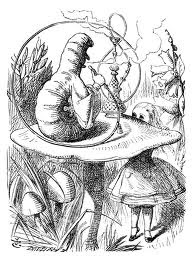Alice in Wonderland and the Origins of Silicon Valley
I reread Alice in Wonderland last year. I’ve been reading a lot of weird books in the last two years but Alice in Wonderland is the weirdest. It’s like a children’s story written by Franz Kafka.
The book and its images continue to resonate. I’ll skip the cheap shot of recalling the Mad Hatter’s Tea Party because a lot of recent commentators have already used it. Also, there’s a serious idea in game theory called the Red Queen Effect, even a whole book about it by Matt Ridley. (Any book by Matt Ridley is recommended.)
But the time Alice in Wonderland really resonated was the 1960s. The following are the lyrics from the group and the song that was virtually the anthem of the Berkeley/San Francisco counterculture. It was written by the group’s lead singer, Gracie Slick.
"White Rabbit" by Jefferson Airplane
One pill makes you larger
And one pill makes you small
And the ones that mother gives you
Don't do anything at all
Go ask Alice
When she's ten feet tall
And if you go chasing rabbits
And you know you're going to fall
Tell 'em a hookah smoking caterpillar
Has given you the call
Call Alice
When she was just small
When men on the chessboard
Get up and tell you where to go
And you've just had some kind of mushroom
And your mind is moving slow
Go ask Alice
I think she'll know
When logic and proportion
Have fallen sloppy dead
And the White Knight is talking backwards
And the Red Queen's "off with her head!"
Remember what the dormouse said;
"Feed your head. Feed your head.”
OK, it’s not surprising that the images in Alice in Wonderland seem psychedelic (explicitly so in the Walt Disney movie version of the book) and would appeal to the Bay Area counterculture. But the story gets even weirder. It is documented in:
John Markoff, What the Dormouse Said: How the Sixties Counterculture Shaped the Personal Computer Industry. 2006.
The counterculture, anti-establishment, drug-taking environment of this area in this period nurtured the thinking about the possibility of a personal computer. This was a radical idea. Some of the research was funded by the Pentagon!
Concepts that would later be crucial to using the PC were first conceived here. They were developed as “the office of the future” by PARC, a think-tank owned by Xerox that employed non-corporate locals. Xerox management in Connecticut then declined to develop these ideas (see Fumbling the Future) but their potential was realized by a new company just down the road – Apple. And Steve Jobs and Steve Wozniak (whose idea of developing a PC was turned down by his employer, HP) were members of a loose group of sixties types called the Homebrew Computer Club, which has attained almost mythical status in the development of the new technology. (Bill Gates bought Microsoft's first commercially successful operating system from a member of the Homebrew Computer Club. He licensed it to the enemy - IBM.)
The book and its images continue to resonate. I’ll skip the cheap shot of recalling the Mad Hatter’s Tea Party because a lot of recent commentators have already used it. Also, there’s a serious idea in game theory called the Red Queen Effect, even a whole book about it by Matt Ridley. (Any book by Matt Ridley is recommended.)
But the time Alice in Wonderland really resonated was the 1960s. The following are the lyrics from the group and the song that was virtually the anthem of the Berkeley/San Francisco counterculture. It was written by the group’s lead singer, Gracie Slick.
"White Rabbit" by Jefferson Airplane
One pill makes you larger
And one pill makes you small
And the ones that mother gives you
Don't do anything at all
Go ask Alice
When she's ten feet tall
And if you go chasing rabbits
And you know you're going to fall
Tell 'em a hookah smoking caterpillar
Has given you the call
Call Alice
When she was just small
When men on the chessboard
Get up and tell you where to go
And you've just had some kind of mushroom
And your mind is moving slow
Go ask Alice
I think she'll know
When logic and proportion
Have fallen sloppy dead
And the White Knight is talking backwards
And the Red Queen's "off with her head!"
Remember what the dormouse said;
"Feed your head. Feed your head.”
OK, it’s not surprising that the images in Alice in Wonderland seem psychedelic (explicitly so in the Walt Disney movie version of the book) and would appeal to the Bay Area counterculture. But the story gets even weirder. It is documented in:
John Markoff, What the Dormouse Said: How the Sixties Counterculture Shaped the Personal Computer Industry. 2006.
The counterculture, anti-establishment, drug-taking environment of this area in this period nurtured the thinking about the possibility of a personal computer. This was a radical idea. Some of the research was funded by the Pentagon!
Concepts that would later be crucial to using the PC were first conceived here. They were developed as “the office of the future” by PARC, a think-tank owned by Xerox that employed non-corporate locals. Xerox management in Connecticut then declined to develop these ideas (see Fumbling the Future) but their potential was realized by a new company just down the road – Apple. And Steve Jobs and Steve Wozniak (whose idea of developing a PC was turned down by his employer, HP) were members of a loose group of sixties types called the Homebrew Computer Club, which has attained almost mythical status in the development of the new technology. (Bill Gates bought Microsoft's first commercially successful operating system from a member of the Homebrew Computer Club. He licensed it to the enemy - IBM.)
There is an interesting question in the history of technology – Why was the personal computer and related technology developed in Silicon Valley (Stanford/SF/Berkeley) and not in Cambridge, Mass (Harvard, MIT, lots of computer companies)? Now you know where to find the answer – go ask Alice.
But the story has one more weird twist. The Pentagon heard about LSD use in the area because of its funding of personal computer research. The army thought there might be a military application – soldiers on LSD would have heightened perception. So the Pentagon funded the use of LSD around Stanford until its negative side-effects became apparent.
To steal a quote – you can’t make this stuff up. Reality (?) is even weirder than Alice in Wonderland.










Comments
Post a Comment